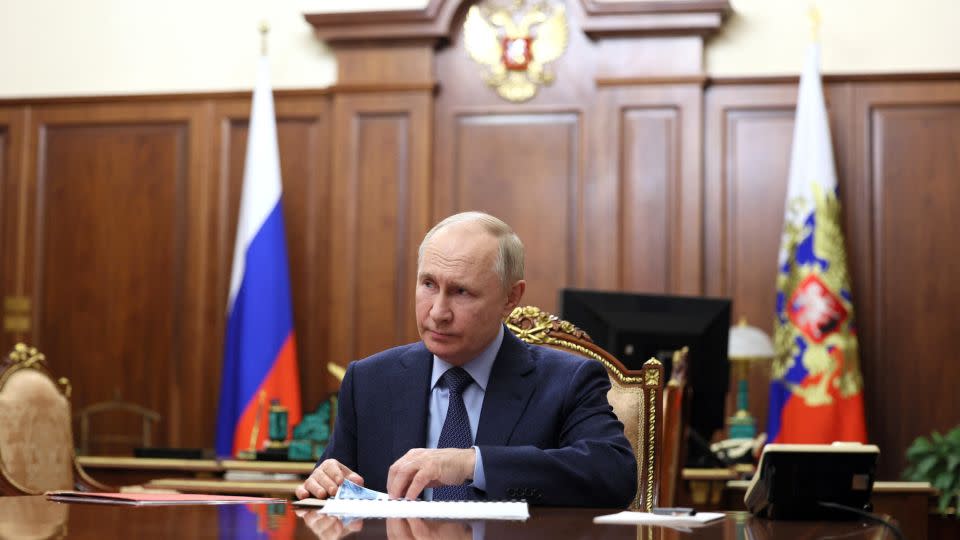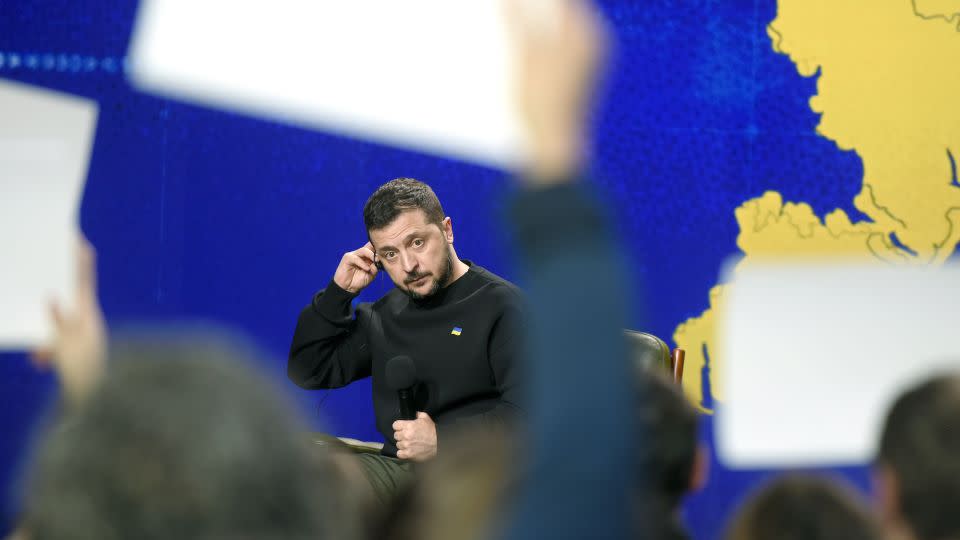Ukraine’s hopes for victory fade in the face of waning Western support and Putin’s relentless war machine
A year ago, a resolute President Volodymyr Zelensky traveled direct from the battlefield of Bakhmut to address the US Congress and meet with President Joe Biden. He was feted as a hero; Ukraine’s determination to resist Russian aggression met with strong bipartisan backing in Washington.
One year on, the outlook looks much grimmer. A long-anticipated Ukrainian offensive in the south has made scant progress. Russia appears to have weathered international sanctions, for now, and has converted its economy into a war machine.
The Russian way of war, absorbing hideous losses of men and materiel but throwing yet more into the fight, has blunted the Ukrainian military’s tactical and technological edge, as its top general admitted in a candid essay last month.
The mood in Moscow seems grimly determined: the goals of the “special military operation” will be achieved, and the fighting will continue until they are.
As the long frontline becomes ever more calcified, the Kremlin senses greater skepticism among Kyiv’s Western backers that Ukraine can recover the 17% of its territory still occupied by Russian forces.
Russian President Vladimir Putin is relishing the much more partisan atmosphere in Washington, where many in the Republican Party are questioning the purpose of sending Ukraine another $61 billion worth of aid as requested by the Biden administration, assessing that it will achieve little on the battlefield.
At his first year-end news conference since the conflict began, Putin scoffed: “Ukraine produces almost nothing today, everything is coming from the West, but the free stuff is going to run out some day, and it seems it already is.”

At the same time, Hungarian Prime Minister Viktor Orban blocked a $55 billion EU package of financial aid for Ukraine, prompting one German politician to say that it was like having Putin himself sitting at the table.
That jeopardizes government spending on everything from salaries to hospitals.
Zelensky, who by his own recent admission is tired, has an ever-harder job as Ukraine’s chief salesman, with events in the Middle East diverting attention from Ukraine as the number-one international crisis.
On the first anniversary of the invasion, he predicted that “2023 will be the year of our victory!” He’s unlikely to make the same optimistic forecast for the coming year.
As December came to a close, Ukraine suffered the biggest Russian air attack since the start of the full-scale invasion. Russia fired 158 drones and missiles – including hypersonic Kinzhals – at targets across Ukraine on Friday, killing at least 18 people and injuring scores more. Zelensky said Russia used “nearly every type of weapon in its arsenal” in the strikes.
Russia is not without its own vulnerabilities, but they are more long-term. The conflict has exacerbated its demographic crisis through emigration and battlefield losses. Nearly 750,000 people left Russia in 2022; analysts expect an even higher number will have voted with their feet this year.
Labor shortages are stoking rising wages and therefore inflation. Evading sanctions and maintaining industrial production comes at a price, with much of that production now devoted to replacing the stunning battlefield losses and the budget deficit exploding accordingly.
The long-term prognosis for the Russian economy is grim – and that may be Putin’s most fundamental legacy.
But as the economist John Maynard Keynes once said, “In the long run we are all dead.” In the short-term Putin appears unassailable. Reelection in March is a formality (the Kremlin has already acknowledged as much.) Contrast that with the US, where a febrile year of campaigning might end with Donald Trump preparing for his second term. That is Kyiv’s nightmare and Moscow’s dream.
The deeply partisan mood in Congress has scuppered the Biden’s administration’s request for further aid for Kyiv. Currently allocated funds for military equipment are nearly drained. One Democratic senator, Chris Murphy, said starkly: “We are about to abandon Ukraine.”
The mantra in Western capitals on supporting Ukraine has been “as long as it takes.” But standing next to Zelensky this month, Biden said the US would support Ukraine “as long as we can.”
Battlefield slog
While the global metrics for Ukraine deteriorate, so the frontlines offer little cheer.
The much-anticipated Ukrainian counteroffensive launched in June was meant to display the superiority of NATO’s strategy of combined arms warfare, drilled into newly-minted Ukrainian brigades who were trained in muddy fields in Germany. But it was alien to Ukrainian military culture and was not matched by superiority in the skies.
What should have been a dash south to the Black Sea became a quagmire in dense minefields, with Western armor picked off from the air by Russian drones and aviation.
Ukrainian units took at most 200 square kilometers of territory over six months. The goals of reaching the coastline, Crimea and splitting Russian forces in the south remained a distant dream.

With the frontlines frozen, Kyiv’s intelligence agencies have turned to more spectacular attacks: sinking a Russian landing ship in Crimea this week and even sabotaging railway lines as far as the Russian Far East. Success in the Black Sea has allowed for relatively safe passage for merchant ships, despite Moscow abandoning a UN-brokered deal last summer.
However, despite their audacity, such operations won’t alter the fundamental balance of the conflict.
Zaluzhny put it bluntly: “The level of our technological development today has put both us and our enemies in a stupor.” The use of surveillance and strike drones deprives both sides of the element of surprise within the confines of the battlefield.
“The simple fact is that we see everything the enemy is doing, and they see everything we are doing.”
But the Russians’ vast reserves of manpower and hardware (Defense Minister Sergei Shoigu boasted that he could raise 25 million men if necessary) mean they can continue bludgeoning the smaller Ukrainian military, making incremental gains at enormous cost.
So it was around Bakhmut last winter; perhaps the same will apply to the ruined Donetsk town of Avdiivka in the next few weeks.
The pool of military recruits in Ukraine has substantially shrunk; battlefield losses have deprived the military of tens of thousands of experienced soldiers and mid-rank officers. “Sooner or later we are going to find that we simply don’t have enough people to fight,” Zaluzhny told the Economist in November.
The arrival of F-16s fighter jets in the spring will undoubtedly help the Ukrainian air force challenge Russian combat planes and support their own ground forces, but they will be no silver bullet. Basic training is one thing; flying into the teeth of Russian air defenses another.
The same would apply even if the US agreed to supply longer-range Army Tactical Missile Systems (ATACMS) to Ukraine. (UK-supplied Storm Shadow missiles have helped target the Russian rear.)
In any event, the paralysis over funding has blocked the pipeline of US weaponry and Europe does not have the capacity to fill the gap.
Some leading analysts conclude it’s time for a clear-eyed reassessment.
“Ukraine and the West are on an unsustainable trajectory, one characterized by a glaring mismatch between ends and the available means,” write Richard Haass and Charles Kupchan in Foreign Affairs.
Ukraine’s goal of recovering all its territory is “out of reach,” they say bluntly. “Where we are looks at best like a costly deadlock.”
They recommend that Ukraine shifts to a defensive posture in 2024 to stem losses, which would “shore up Western support by demonstrating that Kyiv has a workable strategy aimed at attainable goals.”
The Russian military, which has by and large proved inept in offensive operations, would thereby find it even more difficult to take ground.
To others, such a shift would essentially reward aggression, enabling Russia to pause and regroup, with potentially dangerous consequences for others in Russia’s near-abroad. It would also send the wrong message about US commitment to other allies, such as Taiwan. And it’s a non-starter, politically, in Kyiv.

Biden said during Zelensky’s visit that “Putin is banking on the United States failing to deliver for Ukraine. We must, we must, we must prove him wrong.”
It smacked of desperation. Haass and Kupchan say, “Ukraine would be wise to devote incoming resources to its long-term security and prosperity instead of expending it on the battlefield for little gain.”
There are certainly signs of tensions within Ukrainian society as the conflict nears its second anniversary and the economy struggles to start growing again, after shrinking by one-third. The longer several million Ukrainians live elsewhere in Europe, the less likely they are to come back.
For now Zelensky and his inner circle show no sign of compromise. Zelensky won’t countenance a truce or negotiations. “For us it would mean leaving this wound open for future generations,” he told TIME in November.
Instead, barring some unlikely collapse in morale on either side, the same towns and villages destroyed over the last two years will still be fought over in the next. Ukraine will have the means to survive, but not to win.
For more CNN news and newsletters create an account at CNN.com


